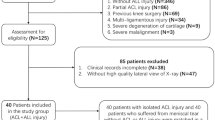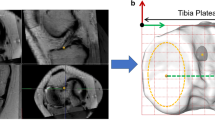Abstract
Purpose
To describe the femoral anterior cruciate ligament (ACL) attachment based on the behind-remnant observation with a new scoring system and to investigate the characteristics of an ACL injured knee.
Methods
One hundred and twenty-six ACL injured knees with four standardized arthroscopic photos and full evaluation under anaesthesia were included in the study. Sixty non-ACL injured knees were also evaluated as control. A scoring system for the femoral ACL attachment was set as follows based on behind-remnant findings; the direct insertion was divided into three portions as proximal, middle and distal. The fibrous extension from the articular surface (indirect insertion) and the severity of synovitis were also graded into 2, 1 and 0 points. The total score was 10 as full marks. The correlation between each score and total score, as well as age at surgery, gender, anterior laxity, pivot-shift test and meniscus injuries, was statistically evaluated with a significance of 0.05.
Results
The femoral attachment score of the ACL injured knees was statistically different from that of the non-ACL injured knees. Anterior laxity was dependent only on the integrity of the proximal portion. Knee instability was significantly correlated with the status of the direct insertion. Medial and lateral meniscus injuries were correlated with the middle part and the distal part of the direct insertion, respectively. The direct insertion was less preserved in distal and articular sides.
Conclusion
Arthroscopic observation behind the remnant of the injured ACL showed clearer findings of the femoral attachment than that from the front. Behind-remnant observation greatly assists in the creation of a correct anatomical tunnel with the preserving remnant. The scoring system indicated several significant correlations between the score and preoperative patient status.





Similar content being viewed by others
References
Ahn JH, Lee YS, Lee SH (2014) Creation of an anatomic femoral tunnel with minimal damage to the remnant bundle in remnant-preserving anterior cruciate ligament reconstruction using an outside-in technique. Arthrosc Tech 20:e175–e179
Arnoczky SP (1983) Anatomy of the anterior cruciate ligament. Clin Orthop Relat Res 172:19–25
Bali K, Dhillon MS, Vasistha RK, Kakkar N, Chana R, Prabhakar S (2012) Efficacy of immunohistological methods in detecting functionally viable mechanoreceptors in the remnant stumps of injured anterior cruciate ligaments and its clinical importance. Knee Surg Sports Traumatol Arthrosc 20:75–80
Chhadia AM, Inacio MC, Maletis GB, Csintalan RP, Davis BR, Funahashi TT (2011) Are meniscus and cartilage injuries related to time to anterior cruciate ligament reconstruction? Am J Sports Med 39:1894–1899
Colombet P, Robinson J, Christel P, Franceschi JP, Djian P, Bellier G, Sbihi A (2006) Morphology of anterior cruciate ligament attachments for anatomic reconstruction: a cadaveric dissection and radiographic study. Arthroscopy 22:984–992
Crain EH, Fithian DC, Paxton EW, Luetzow WF (2005) Variation in anterior cruciate ligament scar pattern: does the scar pattern affect anterior laxity in anterior cruciate ligament-deficient knees? Arthroscopy 21:19–24
Daniel DM, Stone ML, Sachs R, Malcom L (1985) Instrumented measurement of anterior knee laxity in patients with acute anterior cruciate ligament disruption. Am J Sports Med 13:401–407
Dhillon MS, Bali K, Prabhakar S (2012) Differences among mechanoreceptors in healthy and injured anterior cruciate ligaments and their clinical importance. Muscles Ligaments Tendons J 17:38–43
Eguchi A, Adachi N, Nakamae A, Usman MA, Deie M, Ochi M (2014) Proprioceptive function after isolated single-bundle posterior cruciate ligament reconstruction with remnant preservation for chronic posterior cruciate ligament injuries. Orthop Traumatol Surg Res 100:303–308
Hefti F, Muller W, Jakob RP, Staubli HU (1993) Evaluation of knee ligament injuries with the IKDC form. Knee Surg Sports Traumatol Arthrosc 1:226–234
Hefzy MS, Grood ES, Noyes FR (1989) Factors affecting the region of most isometric femoral attachments. Part II: the anterior cruciate ligament. Am J Sports Med 17:208–216
Hensler D, Working ZM, Illingworth KD, Tashman S, Fu FH (2013) Correlation between femoral tunnel length and tunnel position in ACL reconstruction. J Bone Joint Surg Am 95:2029–2034
Hu J, Qu J, Xu D, Zhang T, Zhou J, Lu H (2014) Clinical outcomes of remnant preserving augmentation in anterior cruciate ligament reconstruction: a systematic review. Knee Surg Sports Traumatol Arthrosc 22:1976–1985
Iwahashi T, Shino K, Nakata K, Otsubo H, Suzuki T, Amano H, Nakamura N (2010) Direct anterior cruciate ligament insertion to the femur assessed by histology and 3-dimensional volume-rendered computed tomography. Arthroscopy 26(9 Suppl):S13–S20
Kazusa H, Nakamae A, Ochi M (2013) Augmentation technique for anterior cruciate ligament injury. Clin Sports Med 32:127–140
Koga H, Muneta T, Yagishita K, Watanabe T, Mochizuki T, Horie M, Nakamura T, Sekiya I (2014) Effect of femoral tunnel position on graft tension curves and knee stability in anatomic double-bundle anterior cruciate ligament reconstruction. Knee Surg Sports Traumatol Arthrosc 22:2811–2820
Landis JR, Koch GG (1977) The measurement of observer agreement for categorical data. Biometrics 33:159–174
Maeda S, Ishibashi Y, Tsuda E, Yamamoto Y, Toh S (2011) Intraoperative navigation evaluation of tibial translation after resection of anterior cruciate ligament remnants. Arthroscopy 27:1203–1210
Markolf KL, Burchfield DM, Shapiro MM, Davis BR, Finerman GA, Slauterbeck JL (1996) Biomechanical consequences of replacement of the anterior cruciate ligament with a patellar ligament allograft. Part I: insertion of the graft and anterior–posterior testing. J Bone Joint Surg Am 78:1720–1727
Mifune Y, Ota S, Takayama K, Hoshino Y, Matsumoto T, Kuroda R, Kurosaka M, Fu FH, Huard J (2013) Therapeutic advantage in selective ligament augmentation for partial tears of the anterior cruciate ligament: results in an animal model. Am J Sports Med 41:365–373
Mochizuki T, Muneta T, Nagase T, Shirasawa S, Akita KI, Sekiya I (2006) Cadaveric knee observation study for describing anatomic femoral tunnel placement for two-bundle anterior cruciate ligament reconstruction. Arthroscopy 22:356–361
Mochizuki T, Fujishiro H, Nimura A, Mahakkanukrauh P, Yasuda K, Muneta T, Akita K (2014) Anatomic and histologic analysis of the mid-substance and fan-like extension fibres of the anterior cruciate ligament during knee motion, with special reference to the femoral attachment. Knee Surg Sports Traumatol Arthrosc 22:336–344
Muneta T, Koga H, Nakamura T, Horie M, Watanabe T, Yagishita K, Sekiya I (2014) A new behind-remnant approach for remnant-preserving double-bundle anterior cruciate ligament reconstruction compared with a standard approach. Knee Surg Sports Traumatol Arthrosc. doi:10.1007/s00167-014-3300-2
Nakajima H, Kondo M, Kurosawa H, Fukubayashi T (1979) Insufficiency of the anterior cruciate ligament. Review of our 118 cases. Arch Orthop Trauma Surg 95:233–240
Nakamae A, Ochi M, Deie M, Adachi N, Kanaya A, Nishimori M, Nakasa T (2010) Biomechanical function of anterior cruciate ligament remnants: how long do they contribute to knee stability after injury in patients with complete tears? Arthroscopy 26:1577–1585
Noyes FR, Butler DL, Grood ES, Zernicke RF, Hefzy MS (1994) Biomechanical analysis of human ligament grafts used in knee-ligament repairs and reconstructions. J Bone Joint Surg Am 66:344–352
Ochi M, Adachi N, Uchio Y, Deie M, Kumahashi N, Ishikawa M, Sera S (2009) A minimum 2-year follow-up after selective anteromedial or posterolateral bundle anterior cruciate ligament reconstruction. Arthroscopy 25:117–122
Ochi M, Abouheif MM, Kongcharoensombat W, Nakamae A, Adachi N, Deie M (2011) Double bundle arthroscopic anterior cruciate ligament reconstruction with remnant preserving technique using a hamstring autograft. Sports Med Arthrosc Rehabil Ther Technol 5:30
Sasaki N, Ishibashi Y, Tsuda E, Yamamoto Y, Maeda S, Mizukami H, Toh S, Yagihashi S, Tonosaki Y (2012) The femoral insertion of the anterior cruciate ligament: discrepancy between macroscopic and histological observations. Arthroscopy 28:1135–1146
Siebold R, Fu FH (2008) Assessment and augmentation of symptomatic anteromedial or posterolateral bundle tears of the anterior cruciate ligament. Arthroscopy 24:1289–1298
Wu B, Zhao Z, Li S, Sun L (2013) Preservation of remnant attachment improves graft healing in a rabbit model of anterior cruciate ligament reconstruction. Arthroscopy 29:1362–1371
Woo SL, Hollis JM, Adams DJ, Lyon RM, Takai S (1991) Tensile properties of the human femur-anterior cruciate ligament-tibia complex. The effects of specimen age and orientation. Am J Sports Med 19:217–225
Yasuda K, Kondo E, Ichiyama H, Kitamura N, Tanabe Y, Tohyama H, Minami A (2004) Anatomic reconstruction of the anteromedial and posterolateral bundles of the anterior cruciate ligament using hamstring tendon grafts. Arthroscopy 20:1015–1025
Yasuda K, Kondo E, Kitamura N, Kawaguchi Y, Kai S, Tanabe Y (2012) A pilot study of anatomic double-bundle anterior cruciate ligament reconstruction with ligament remnant tissue preservation. Arthroscopy 28:343–353
Zantop T, Brucker PU, Vidal A, Zelle BA, Fu FH (2007) Intraarticular rupture pattern of the ACL. Clin Orthop Relat Res 454:48–53
Zantop T, Diermann N, Schumacher T, Schanz S, Fu FH, Petersen W (2008) Anatomical and nonanatomical double-bundle anterior cruciate ligament reconstruction: importance of femoral tunnel location on knee kinematics. Am J Sports Med 38:678–685
Author information
Authors and Affiliations
Corresponding author
Rights and permissions
About this article
Cite this article
Muneta, T., Koga, H., Nakamura, T. et al. Behind-remnant arthroscopic observation and scoring of femoral attachment of injured anterior cruciate ligament. Knee Surg Sports Traumatol Arthrosc 24, 2906–2914 (2016). https://doi.org/10.1007/s00167-015-3574-z
Received:
Accepted:
Published:
Issue Date:
DOI: https://doi.org/10.1007/s00167-015-3574-z




